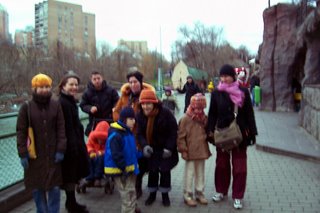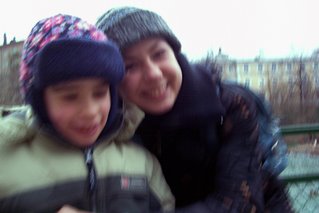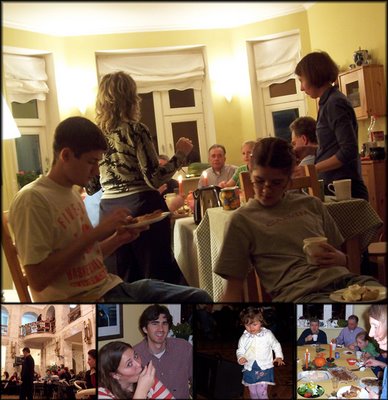(Matt)
We apologize for the almost two-month gap between this post and our last, but the momentous weight of the events in the interim have given us a need to "set a spell" and gather our thoughts.
The most surprising news is that Matt has been offered and has accepted a tenure-track professorship at a large research university in Texas. We had been praying that our choice would be made clear, and it has become unquestionably clear that this is the "right" next move. We just signed a six-month lease on an apartment here in CA, so it looks as though our transition from California to Texas will begin in early August of 2007. The prospect of starting a new career and having a more stable (read: actually paying) basis for researching and teaching is really exciting, and we are looking forward to finding our place within a new community. The job itself is an answer to prayer; teaching at a big school presents both a blessing and a challenge. I have to admit personally that I am anxious about the process of establishing tenure and getting a book-length work ready for publication, but at the same time I have seen my greatest fears turned into moments of faith-building and trust in the last few years.
What surprises us most about the "good news" is how we have acclimated to the reality of having the next big phase of our life settled, to a certain extent. Our discussions of late have revolved around our sensations of scatteredness and even confusion. We’re excited about the future and at the same time we feel like we’re stumbling around a bit in the present.
This state of nebulousness is not really a bad thing overall. In fact, I know that we will emerge with a greater clarity of vision. In the meantime, at least our blog is back up :)
Tuesday, February 27, 2007
Thursday, January 11, 2007
Back home
We made it back home to so cal last night and are staying with some sweet friends until we can get into a place.
These past few weeks have been crazy going around from place to place trying to squeeze as much as we could out of our time while we were in Texas. Family—I know some of y’all we only got to be with for a few hours, but, sitting next to Francie and feeling the radiance of her spirit on a Sunday night, getting to feel the life growing in Ashleigh’s tummy, traveling with Mema, talks with the cousins—these things and many more brought a warmth to my spirit; thank you for blessing us with your lives.
Because we did so much hopping around through Texas and Philadelphia (praise Him for the blessing of a school-site interview!) I know for at least myself I didn’t get to process everything that happened as we transitioned to life back here. We were blessed so much through mutual sharing, love, encouragement, etc. with those we love back in Russia—because of this, I felt this empty space as we returned to life back in the states; partly because I’m just plain sad about the separation and partly because I hadn’t quite thought through how exactly those relationships would continue when we returned.
Along with those feelings, as we drove back to California I felt a little nervous (along with excitement) about getting back into life and lives—wasn’t quite sure about what things would look like, especially since we’re unsure where God will take us after these next six months in Riverside.
This morning I spent some time driving around and at a place of peace for me here in Riverside and the Spirit blessed me with my own renewed sense of peace that I hadn’t felt since we were back in Moscow. Thank you, Father. I feel healed.
-Makinzie
These past few weeks have been crazy going around from place to place trying to squeeze as much as we could out of our time while we were in Texas. Family—I know some of y’all we only got to be with for a few hours, but, sitting next to Francie and feeling the radiance of her spirit on a Sunday night, getting to feel the life growing in Ashleigh’s tummy, traveling with Mema, talks with the cousins—these things and many more brought a warmth to my spirit; thank you for blessing us with your lives.
Because we did so much hopping around through Texas and Philadelphia (praise Him for the blessing of a school-site interview!) I know for at least myself I didn’t get to process everything that happened as we transitioned to life back here. We were blessed so much through mutual sharing, love, encouragement, etc. with those we love back in Russia—because of this, I felt this empty space as we returned to life back in the states; partly because I’m just plain sad about the separation and partly because I hadn’t quite thought through how exactly those relationships would continue when we returned.
Along with those feelings, as we drove back to California I felt a little nervous (along with excitement) about getting back into life and lives—wasn’t quite sure about what things would look like, especially since we’re unsure where God will take us after these next six months in Riverside.
This morning I spent some time driving around and at a place of peace for me here in Riverside and the Spirit blessed me with my own renewed sense of peace that I hadn’t felt since we were back in Moscow. Thank you, Father. I feel healed.
-Makinzie
Granddad
Matt’s granddad passed away this past Sunday. I know my relationship was different with him than that of his kids or grandkids because I’ve only known him for the past 8 or so years. I want to say thank you, though, to Jack. Thank you for being willing to share and laugh with me (things I did with my own Papa before he died 9 years ago). I am thankful that we were blessed to be with Granddad for a few hours over the holidays and thankful for God’s perfect timing through this whole thing and thankful that for all of our grandparents that have guided and been a voice in our lives as we try to live lives of love that we’ve seen through them.
-Makinzie
-Makinzie
Friday, December 22, 2006
Scattered leaves

"All mankind is of one Author, and is of one volume; when one man dies, one chapter is not torn out of the book, but translated into a better language; and every chapter must be so translated. God employs several translators; some pieces are translated by age, some by sickness, some by war, some by justice; but God's hand is in every translation, and his hand shall bind up all our scattered leaves again, for that library where every book shall lie open to one another."
--John Donne
Wednesday, December 20, 2006
Back
Just letting y'all know we made it back safe and sound. We're in Texas for the next week, then off to Philly for Matt's job stuff, back to Texas for another week and should be in so cal again around the 10th of January. Our old cell phone is back on if y'all need/want to reach us. Thank you for your prayers, and we'll post more once we've had a chance to process some things.
Love y'all-
Makinzie
Love y'all-
Makinzie
Friday, December 15, 2006
Goodbye, Moscow
Monday, December 11, 2006
Sadness
I sit here, three days left to go out here, trying to process the incredible sadness I’ve been feeling in my soul over these last few days. This past weekend was filled with last conversations, times of encouragement and being encouraged, laughter, tears. As we were all praying on Friday night, I acknowledged that part of my heart will remain here—with these beautiful people that have allowed us to be a part of their lives. This I say to you, dear friends. . .
“I still remember all the wonder,
The glorious thrill of meeting you,
The momentary spell of splendor,
Spirit of beauty pure and true.
When sadness came upon me, endless,
In vain society’s direst days,
I heard your voice, your accents tender,
And dreamt of heaven in your face.
Now once again my heart is racing,
Proclaiming the renewal of
My former tears, my inspiration,
My sense of God, and life, and love.”
-Alexander Pushkin
I love you all.
-Makinzie
“I still remember all the wonder,
The glorious thrill of meeting you,
The momentary spell of splendor,
Spirit of beauty pure and true.
When sadness came upon me, endless,
In vain society’s direst days,
I heard your voice, your accents tender,
And dreamt of heaven in your face.
Now once again my heart is racing,
Proclaiming the renewal of
My former tears, my inspiration,
My sense of God, and life, and love.”
-Alexander Pushkin
I love you all.
-Makinzie
Turgenev
"Can their prayers and their tears be fruitless? Can love, sacred, devoted love, not be all-powerful? Oh, no! No matter how passionate, sinning, rebellious is the heart hidden in the grave, the flowers growing on it look at us serenely with their innocent faces; they speak to us not only of that eternal peace, of that great peace of 'impassive' nature; they speak to us also of eternal reconciliation and of life everlasting. . ."
Fathers and Sons, Ivan Turgenev
Father, thank you for peace, reconciliation, and life.
-Makinzie
Fathers and Sons, Ivan Turgenev
Father, thank you for peace, reconciliation, and life.
-Makinzie
Class Today
Today in my second to last Russian lesson, we learned about how to use comparative words (bigger, newer, best, etc.). As I was trying to get these words into my brain, it got me thinking. . .do we really need these words? “I have the fastest car, newest home, better work. . .” Hmm. . .
-Makinzie
-Makinzie
Friday, December 08, 2006
"Coffee, please"
A quick anecdote from today's "Russian Excursion". Enjoy this one while you're sipping your Starbucks (Joe) and reading our blog before you start your day.
I asked my my Russian teacher, Nelly Alexandrovna Roslyakova: "Do Russians prefer tea or coffee?" She answered "tea" and then went on to explain that tea is tradition
 al in Russia while coffee is imbibed usually only in the cities; it's a "foreign" drink. She continued to explain that Peter I introduced coffee and had a special plan for guaranteeing its popularity in Russia. How? He gave his nobles a choice: "Pi'ye ili v tyiurmu". The phrase is funnier in Russian, but it roughly translates to "Coffee or prison." The favorable reception of coffee in Russia was thus secured.
al in Russia while coffee is imbibed usually only in the cities; it's a "foreign" drink. She continued to explain that Peter I introduced coffee and had a special plan for guaranteeing its popularity in Russia. How? He gave his nobles a choice: "Pi'ye ili v tyiurmu". The phrase is funnier in Russian, but it roughly translates to "Coffee or prison." The favorable reception of coffee in Russia was thus secured.I never know what I'll learn when I ask questions here.
--Matt
Thursday, December 07, 2006
Penultimate
(Matt)
We have just over a week left and I'm beginning now to process our experiences in broader terms than what I need to know to make it through the next week. Last evening, Makinzie and I had a discussion about the ways in which our time here has impacted our own life-decisions and the direction we want our lives to take in the future. We both agreed that living in Moscow is not so much different from living in any Western city, and yet I still believe that acclimating to life in Russian culture has made the most minute details of our "usual life" in America stand out in greater relief. The biggest question for me right now is how this defamiliarizing way of viewing our past will affect what we accept as "standard" for our lives in the future. I know I will be dwelling on this question for a long time in the weeks to come, and I would welcome thoughts from your own experiences.
I leave you with two words of wisdom from what I've learned in Russia:
We have just over a week left and I'm beginning now to process our experiences in broader terms than what I need to know to make it through the next week. Last evening, Makinzie and I had a discussion about the ways in which our time here has impacted our own life-decisions and the direction we want our lives to take in the future. We both agreed that living in Moscow is not so much different from living in any Western city, and yet I still believe that acclimating to life in Russian culture has made the most minute details of our "usual life" in America stand out in greater relief. The biggest question for me right now is how this defamiliarizing way of viewing our past will affect what we accept as "standard" for our lives in the future. I know I will be dwelling on this question for a long time in the weeks to come, and I would welcome thoughts from your own experiences.
I leave you with two words of wisdom from what I've learned in Russia:
- You can say to a person Вы хорошо выглядиш (Voi Horosho VOI-gliadish) but never Вы хорошо выгладиш (Voi Horosho voi-GLA-dish). The difference in pronunciation is subtle but crucial. The first phrase means "you look great today"; the second phrase, oh-so-easy to mispronounce, means "you iron clothes well today", and carries the implication that your addressee should consider doing your laundry for you.
- I was reading a Christmas Card in Russian today and translating some of the words I didn't know. Wanting to practice the phraseology, I told someone "мечты ваши заветные испoртяться скоро" ("Mechti vashi zovetniye ispolnayayutsa skora"). I had wanted to say "May your precious dreams soon come true." Ah, but the crucial Russian verb is испoлняться, which looks very similar to, but is not испoртяться. Anyway, what I had said was "May your precious dreams quickly come to ruin."
Sunday, December 03, 2006
We goin’ to the zoo, zoo, zoo

This past Saturday morning I had the blessing of getting to hang out with some really cool kids, parents, and volunteers at a zoo here in Moscow. A group children with disabilities (similar to the students I have in my own classroom back in so cal) and people that care about these kids get together for outings in parks around Moscow to provide relief for the parents, promote social awareness, and to serve the kids.
 Oh, how my soul was refreshed to be a part of this! I miss my students and the special light they reflect in others. I had great conversations with people about the status of services for these kids in Russia as well as practical ideas of how they might be better served to live life more independently. Over the course of these past few months here, I have also been blessed to have been able to dream with students and friends whose heart is with these children.
Oh, how my soul was refreshed to be a part of this! I miss my students and the special light they reflect in others. I had great conversations with people about the status of services for these kids in Russia as well as practical ideas of how they might be better served to live life more independently. Over the course of these past few months here, I have also been blessed to have been able to dream with students and friends whose heart is with these children. Father, it brings warmth to my spirit and a smile to my face to see people’s hopes to change the system. I earnestly ask your guidance and blessing in these friends’ lives along with the children they so beautifully strive to serve. May You be glorified in all that is done here to seek justice!
Father, it brings warmth to my spirit and a smile to my face to see people’s hopes to change the system. I earnestly ask your guidance and blessing in these friends’ lives along with the children they so beautifully strive to serve. May You be glorified in all that is done here to seek justice!-Makinzie
Firsts
This weekend we had several firsts (at least firsts in a while). . .
We visited a house for the first time outside of the city of some friends my parents knew over 20 years ago.
 I tried холва (halva) for the first time brought over by some students this past weekend. How could something made from the byproduct of sunflower oil and that has such a strange greyish-greenish color actually taste good?
I tried холва (halva) for the first time brought over by some students this past weekend. How could something made from the byproduct of sunflower oil and that has such a strange greyish-greenish color actually taste good?

We took our first car ride in 3 months going to the ouside of town, and we both felt queasy--really queasy; guess we'll have to take car riding slow when we get back.
 I got to go to the zoo with some kids this weekend—first time I actually saw character people standing around talking with their heads off more—made me laugh.
I got to go to the zoo with some kids this weekend—first time I actually saw character people standing around talking with their heads off more—made me laugh.
-Makinzie
We visited a house for the first time outside of the city of some friends my parents knew over 20 years ago.
 I tried холва (halva) for the first time brought over by some students this past weekend. How could something made from the byproduct of sunflower oil and that has such a strange greyish-greenish color actually taste good?
I tried холва (halva) for the first time brought over by some students this past weekend. How could something made from the byproduct of sunflower oil and that has such a strange greyish-greenish color actually taste good?
We took our first car ride in 3 months going to the ouside of town, and we both felt queasy--really queasy; guess we'll have to take car riding slow when we get back.
 I got to go to the zoo with some kids this weekend—first time I actually saw character people standing around talking with their heads off more—made me laugh.
I got to go to the zoo with some kids this weekend—first time I actually saw character people standing around talking with their heads off more—made me laugh.-Makinzie
Wednesday, November 29, 2006
Reasons I am thankful for our community in Russia. . .
- new friends being willing to enter into our lives and allow us to be a part of theirs
- both the apartment manager and I waiting, smiling, waving, and talking as I enter/leave the building
- seeing people I know where I shouldn’t see them (in a city of millions); seeing people out on the street, in the metro, out walking—there’s something about that that fills my soul up with such a warmness
- being called out in truth by a friend
- walking with my husband
- seeing changes in friends and in myself that were not purposely sought out but are ultimately for good
- reading/studying His word together
- eating Russian meals in Russian homes
- having our home filled with those we love
- sharing in people's dreams
-Makinzie
Lily
 Lily is a dear friend who entered the university when she was only 16 (“high school” finishes around 16 or 17). She is this incredible woman of peace and has this beautiful spirit that encourages anyone she is around. Lily has recently been struggling with confusions of where she should be doing His work. She is currently frustrated with the Russian system of how social work (her major) is honorably conducted here. I ask you to join me in praying for her; she is such a good and just woman. Father, I ask for you to bless Lily with boldness and encouragement in whatever choice she makes—thank you for this dear friend with such a pure desire to seek change in her motherland.
Lily is a dear friend who entered the university when she was only 16 (“high school” finishes around 16 or 17). She is this incredible woman of peace and has this beautiful spirit that encourages anyone she is around. Lily has recently been struggling with confusions of where she should be doing His work. She is currently frustrated with the Russian system of how social work (her major) is honorably conducted here. I ask you to join me in praying for her; she is such a good and just woman. Father, I ask for you to bless Lily with boldness and encouragement in whatever choice she makes—thank you for this dear friend with such a pure desire to seek change in her motherland.-Makinzie
The Box of Chocolates
(Matt) Events of last Friday, Nov. 25
“Don’t forget” Nelly Alexandrovna (my Russian teacher) told me as she handed me a plain white parcel that she had identified only as “heavy.” I put the box in my bag and told her, “OK, I won’t forget.” I really had no intention of forgetting the box (which was not really all that heavy), but I didn’t realize at the time how direly serious Nelly was in her command. She wasn’t requesting that I not forget, she was warning me in a subtle Russian way that to forget the box would be to open the floodgates of misery and horror for me, her, and a google of other Russians whose happiness and well-being apparently depended on the safe delivery of the white box that was now in my very possession.
I later found out that the box contained about twenty-five individually wrapped chocolate candies. I also later found out the meaning of the word “kashmar”—in Russian, “nightmare.”
We continued on our journey of the day, which was to the “roinok” or market, called “Izmailova,” a notable place for tourists to gather to be “trapped” and sellers to practice the English phrase “Come look; only 500 rubles.” For some reason, Izmailova is at least 20 degrees colder than any other place in the city of Moscow, and my hands would be red and freezing for at least six hours after we eventually left the market.
The first thing that Nelly said to Makinzie and I when we entered the threshold of the market was “don’t speak.” Apparently, our fluent and perfectly-accented Russian capabilities betray our real identities of “rich Americans.” I asked Nelly if we wouldn’t already be identified as foreigners anyway because I was wearing Bert’s blue and bright yellow Columbia jacket and Makinzie was wearing a bright white fleece coat and neon green mittens and stocking cap. Given that the normal Russian outfit is black everything, I was sure that we couldn’t have looked more foreign even if we were wearing our everyday Texan attire of spurs, boots, and oversized ten-gallon hats. But Nelly said our clothing was OK. Our eyes, however, were not OK. Don’t look interested or look around, she explained—look bored and tired.
So we donned the identity of the “typical” Russian customer, disinterested, aloof, apathetic. The change was immediate: suddenly we blended seamlessly into the crowd.
Except that none of the market sellers recognized our obvious Russianness. A woman came running up to us as we passed by her kiosk, babbling a stream of friendly English phrases. “Matryoshki dolls,” she said (these are the nesting dolls); “only fifty rubles! Please look!”
Nelly Alexandrovna bristled. She fired back at the woman a string of harsh sounding Russian phrases, asking her, “What do you think we are, foreigners? Why are you talking to us in English?”
“Oh, I’m so sorry,” said the seller, now speaking rapidly in Russian. “I thought you were Americans. The dolls are only 30 rubles.”
After Nelly gave the woman a brief lecture about the unfairness of spiking the prices for foreigners, she asked the seller, “what makes you think we’re Americans, any way.”
“Well, it’s your clothing,” the woman said. “You look like foreigners.”
“What, me?” Nelly shot back. “What are you saying?”
“No; the young man and the young lady; they’re wearing such bright clothing—they look like Americans.”
So much for our disguise.
The fun continued as we went from stall to stall. The sellers weren’t quite sure how to treat a group where one woman spoke English and the other two customers were apparently mute. They frequently asked Nelly, “do they [pointing to us like we were three-year-olds] speak Russian?” Usually, I would answer “Da” at the exact same moment that Nelly answered “n’yet.” We received more than one look that conveyed the idea that we must have been dragging Nelly along with us at gunpoint. Fortunately, no one was going to raise prices on Nelly, so her presence overrode our obvious failure to perform Rusianness in any competent way.
Well, having finished our experience of the day at the market, we headed back into the Metro station, where we had to part ways. I told Nelly that we were going to go to the university for the rest of the day because we had an event to attend at night. She said that she was going to the train station and then out of town. We exchanged good byes and separated.
The chocolates stayed with me.
At the halfway point on our hour-long journey to RACU, Makinzie and I decided that we would just head home instead of waiting at the university. It seemed like a good decision because we needed to rest and we had already prepared food to eat at home. Along the way, I looked into my bag and saw the chocolates. “Oh no!” I cried, turning to Makinzie. “What should we do?” Well, we considered backtracking the 30 minutes to the last place we had seen Nelly, but then our better judgment kicked in and we decided that she would have already left for the train. So we went home and rested for about three hours and then got out again and made the 1 ½ hour trip back to RACU for the evening’s events.
Imagine our surprise, then, when we arrived at the university and were greeted by about five students who announced, “Nelly Alexandrovna has been looking for you!” Yes; although we had last seen Nelly almost six hours previous, on the entirely opposite side of Moscow, she had taken a two-hour metro ride in the opposite direction from her intended destination in order to find us and obtain her chocolates. She had arrived at RACU almost four hours before us!
Nelly wasn’t very happy when she saw us. I gave her the chocolates and she said, “You told me that you wouldn’t forget!”
“I know,” I told her, “I’m very sorry!”
“You also told me that you were coming straight to RACU!” she exclaimed.
I didn't know how to make my voice more peninent. “I know! I’m sorry; we decided to go home and rest!” I exclaimed, with my best puppy eyes.
By now, a small crowd had gathered to witness the spectacle. I don’t know very many words for “I’m sorry” in Russian, but I used all of them in trying to apologize to Nelly.
After a few more minutes of clarification, Nelly left the university with her chocolates, apparently bound for another two-hour ride on the Metro and then a longer transfer on an electric train to the outer limits of Moscow.
On this Tuesday when I met with Nelly again for my lesson, I tried one more time to make amends for what must have been a disappointing weekend. After I expressed my apologies, I have to confess that I expected the typical American reciprocation, something to the effect of "No, don't worry about it; it was my fault as much as yours."
Instead, Nelly corrected my phrase. I had said, literally, "Please excuse me for what happened last Friday." What I should have said, apparently, was (again, literally translated) "I felt myself ashamed in front of you last Friday."
Так жизнь в Россие ("such is life in Russia")
--Matt
“Don’t forget” Nelly Alexandrovna (my Russian teacher) told me as she handed me a plain white parcel that she had identified only as “heavy.” I put the box in my bag and told her, “OK, I won’t forget.” I really had no intention of forgetting the box (which was not really all that heavy), but I didn’t realize at the time how direly serious Nelly was in her command. She wasn’t requesting that I not forget, she was warning me in a subtle Russian way that to forget the box would be to open the floodgates of misery and horror for me, her, and a google of other Russians whose happiness and well-being apparently depended on the safe delivery of the white box that was now in my very possession.
I later found out that the box contained about twenty-five individually wrapped chocolate candies. I also later found out the meaning of the word “kashmar”—in Russian, “nightmare.”
We continued on our journey of the day, which was to the “roinok” or market, called “Izmailova,” a notable place for tourists to gather to be “trapped” and sellers to practice the English phrase “Come look; only 500 rubles.” For some reason, Izmailova is at least 20 degrees colder than any other place in the city of Moscow, and my hands would be red and freezing for at least six hours after we eventually left the market.
The first thing that Nelly said to Makinzie and I when we entered the threshold of the market was “don’t speak.” Apparently, our fluent and perfectly-accented Russian capabilities betray our real identities of “rich Americans.” I asked Nelly if we wouldn’t already be identified as foreigners anyway because I was wearing Bert’s blue and bright yellow Columbia jacket and Makinzie was wearing a bright white fleece coat and neon green mittens and stocking cap. Given that the normal Russian outfit is black everything, I was sure that we couldn’t have looked more foreign even if we were wearing our everyday Texan attire of spurs, boots, and oversized ten-gallon hats. But Nelly said our clothing was OK. Our eyes, however, were not OK. Don’t look interested or look around, she explained—look bored and tired.
So we donned the identity of the “typical” Russian customer, disinterested, aloof, apathetic. The change was immediate: suddenly we blended seamlessly into the crowd.
Except that none of the market sellers recognized our obvious Russianness. A woman came running up to us as we passed by her kiosk, babbling a stream of friendly English phrases. “Matryoshki dolls,” she said (these are the nesting dolls); “only fifty rubles! Please look!”
Nelly Alexandrovna bristled. She fired back at the woman a string of harsh sounding Russian phrases, asking her, “What do you think we are, foreigners? Why are you talking to us in English?”

“Oh, I’m so sorry,” said the seller, now speaking rapidly in Russian. “I thought you were Americans. The dolls are only 30 rubles.”
After Nelly gave the woman a brief lecture about the unfairness of spiking the prices for foreigners, she asked the seller, “what makes you think we’re Americans, any way.”
“Well, it’s your clothing,” the woman said. “You look like foreigners.”
“What, me?” Nelly shot back. “What are you saying?”
“No; the young man and the young lady; they’re wearing such bright clothing—they look like Americans.”
So much for our disguise.
The fun continued as we went from stall to stall. The sellers weren’t quite sure how to treat a group where one woman spoke English and the other two customers were apparently mute. They frequently asked Nelly, “do they [pointing to us like we were three-year-olds] speak Russian?” Usually, I would answer “Da” at the exact same moment that Nelly answered “n’yet.” We received more than one look that conveyed the idea that we must have been dragging Nelly along with us at gunpoint. Fortunately, no one was going to raise prices on Nelly, so her presence overrode our obvious failure to perform Rusianness in any competent way.
Well, having finished our experience of the day at the market, we headed back into the Metro station, where we had to part ways. I told Nelly that we were going to go to the university for the rest of the day because we had an event to attend at night. She said that she was going to the train station and then out of town. We exchanged good byes and separated.
The chocolates stayed with me.
At the halfway point on our hour-long journey to RACU, Makinzie and I decided that we would just head home instead of waiting at the university. It seemed like a good decision because we needed to rest and we had already prepared food to eat at home. Along the way, I looked into my bag and saw the chocolates. “Oh no!” I cried, turning to Makinzie. “What should we do?” Well, we considered backtracking the 30 minutes to the last place we had seen Nelly, but then our better judgment kicked in and we decided that she would have already left for the train. So we went home and rested for about three hours and then got out again and made the 1 ½ hour trip back to RACU for the evening’s events.
Imagine our surprise, then, when we arrived at the university and were greeted by about five students who announced, “Nelly Alexandrovna has been looking for you!” Yes; although we had last seen Nelly almost six hours previous, on the entirely opposite side of Moscow, she had taken a two-hour metro ride in the opposite direction from her intended destination in order to find us and obtain her chocolates. She had arrived at RACU almost four hours before us!
Nelly wasn’t very happy when she saw us. I gave her the chocolates and she said, “You told me that you wouldn’t forget!”
“I know,” I told her, “I’m very sorry!”
“You also told me that you were coming straight to RACU!” she exclaimed.
I didn't know how to make my voice more peninent. “I know! I’m sorry; we decided to go home and rest!” I exclaimed, with my best puppy eyes.
By now, a small crowd had gathered to witness the spectacle. I don’t know very many words for “I’m sorry” in Russian, but I used all of them in trying to apologize to Nelly.
After a few more minutes of clarification, Nelly left the university with her chocolates, apparently bound for another two-hour ride on the Metro and then a longer transfer on an electric train to the outer limits of Moscow.
On this Tuesday when I met with Nelly again for my lesson, I tried one more time to make amends for what must have been a disappointing weekend. After I expressed my apologies, I have to confess that I expected the typical American reciprocation, something to the effect of "No, don't worry about it; it was my fault as much as yours."
Instead, Nelly corrected my phrase. I had said, literally, "Please excuse me for what happened last Friday." What I should have said, apparently, was (again, literally translated) "I felt myself ashamed in front of you last Friday."
Так жизнь в Россие ("such is life in Russia")
--Matt
Thursday, November 23, 2006
Thanksgivens

Good week.
It ended with a nice Thanksgiving meal today--the traditional American turkey, stuffing, sweet potatoes, and pumpkin pie, eaten with friends over the course of five or six hours. Makinzie even made her very first pecan pie for the meal (without Karo syrup, mind you**) and it turned out great!
We're sitting and typing now, quite full with a lot of good food. Truly a good Thanksgiving, even thousands of miles away.
And good news came aplenty this week even before Thanksgiving. We had an excellent class together, my students and I, on Tuesday, and I was really very encouraged by the experience. I had the pleasure of hearing some of the students say, "That was a good discussion today! Thanks Mr. Heard!" I was excited to see the students fully involved and participating; the entire atmosphere was very positive and even fun. Thanks for your prayers for me on this issue.
On top of this, we found out some of the most important "American" news we've recieved so far--the first request for an MLA interview in December.
So we're happy tonight and rejoicing with all of you, family and friends. Our Thanksgiving day proper is almost over now (it's 11:00 pm), but we will be thinking about you as you celebrate. We love you!
--Matt
**Footnote: Kinzie has uncovered a conspiracy kept secret by the Karo syrup company. She has discovered that the first recipes for pecan pies began appearing around the same time that Karo syrup came into being. We can only conclude from these facts that the Karo brand company invented pecan pie as a way of tricking Americans into associating Karo syrup with our most beloved Thanksgiving traditions.
Happy Thanksgiving everyone!
Wednesday, November 22, 2006
Благодарении

"And it seems to me that this pain is something for a time, for it purges and makes us know ourselves and ask for mercy; for the Passion of our Lord is comfort to us against all this, and that is his blessed will. And because of the tender love which our good Lord has for all who will be saved, he comforts readily and sweetly, meaning this: It is true that sin is the cause of all this pain, but all will be well, and every kind of thing will be well."
Julian of Norwich, Book of Showings, 1400 A.D.
Monday, November 20, 2006
December 16th
Malika and I meet once a week to talk, read, and encourage one another; we just finished our time this evening. In case y'all were wondering, she did end up going to Krasnodar--had two opportunities to begin discussions with people about His love on the 28-hour train ride; she is a beautiful woman of love and truth, and it made my heart happy to see her encouraged through meeting with her friend and connecting with people along the way. I feel so blessed to find a sister out here in whom I've been able to connect with in such a deep way so quickly.
Brings me to my confusions as of late. . .this past Saturday marked the four week countdown until our return to the states; this past weekend was one of beginning to and furthering connections with some friends of old ("old" being a relative term, since our journey here has only been one of three months in total) and new friends. At times, I've gotten down about the few weeks we have left in Moscow (just as were starting to hit that breakthrough point in some relationships, we're returning), other times I weep from a deep sadness as we stand at the metro doors closing, waving to our friend as she journeys back to her home, and still other times, I feel pressure and feel the need to be in panic mode and do, do, do in order to compensate for the December 16th return date quickly approaching.
Working through all these pulls and feelings, I have been reminded tonight in 1 Peter to put this quickly approaching date behind me for the time being and just "love. . .deeply,"--man, I like that phrase. With our imminent return to the i.e., I am excited and further convicted about some practical discussions Matt and I've had about how we might live lives that are "holy in all that [we] do." Pray that we might fervently continue our journey out here for these next few weeks; thank you for you guys' partnership and encouragement; we are blessed to have y'all out here in Russia with us.
Love y'all-
Makinzie
Brings me to my confusions as of late. . .this past Saturday marked the four week countdown until our return to the states; this past weekend was one of beginning to and furthering connections with some friends of old ("old" being a relative term, since our journey here has only been one of three months in total) and new friends. At times, I've gotten down about the few weeks we have left in Moscow (just as were starting to hit that breakthrough point in some relationships, we're returning), other times I weep from a deep sadness as we stand at the metro doors closing, waving to our friend as she journeys back to her home, and still other times, I feel pressure and feel the need to be in panic mode and do, do, do in order to compensate for the December 16th return date quickly approaching.
Working through all these pulls and feelings, I have been reminded tonight in 1 Peter to put this quickly approaching date behind me for the time being and just "love. . .deeply,"--man, I like that phrase. With our imminent return to the i.e., I am excited and further convicted about some practical discussions Matt and I've had about how we might live lives that are "holy in all that [we] do." Pray that we might fervently continue our journey out here for these next few weeks; thank you for you guys' partnership and encouragement; we are blessed to have y'all out here in Russia with us.
Love y'all-
Makinzie
Sunday, November 19, 2006
Thanksgivings
(Matt)
19-11-06
Sunday morning, 7:45 am. Outside, it’s peaceful. Not quite dawn, the dim light reveals the bare outlines of apartment buildings and the silhouettes of trees blanketed in snow. An occasional lamp shines in the windows of the otherwise dark clusters of buildings, but for the most part, the city is quiet and still. It feels as though I’m the only one awake.
Inside, I’m peaceful, too. Although I imbibed coffee last night at much too late an hour to get a full night’s sleep, I somehow feel rested and refreshed—a welcome state of mind that has been much desired in the past few weeks. Last night we had more students over than we have ever had before; Makinzie and I both invited our classes on the same evening, and consequently our living room was so packed that people were spilling out into the dining room and kitchen. And whereas on most other nights we have spoken in English to help the students in Makinzie’s intensive language classes, last night the students informed us that we were “outnumbered” and would have to speak in Russian only. These rules intimidated me at first. I don’t like laughter at my expense, and having twenty people hanging on my every word makes me hesitant. In the end, though, the circumstances inspired a sense of community and fraternity that put my previous thinking in sharp relief and made me realize certain imperfections in my thinking.
Let me explain. Remember that in the preceding weeks, I have been questioning seriously my exact role here in Russia. Not that I ever doubted our mission here in general, but in the midst of complaining students, a time-consuming job hunt, and the ongoing struggle to improve my Russian past the level of a five-year old, I wondered specifically, “what I am being taught through this process?” Then on Friday night, Makinzie and I went to a “Dyen Blagadareneye” (Thanksgiving Day) party hosted by the students at RACU. The entire program was in Russian, without a word of English spoken, and I left the party thinking about “hospitality” in Russia and the contrast between my experience and all of your own reports about the people you have encountered in foreign countries. Joe, Dan, Liam, Mema—you all came back from trips abroad talking about the warmth and friendliness of the people you met, and I have been desirous of finding the same attitude in the Russian people. But I have felt that we keep meeting with a shell of indifference and aloofness (actually, that I keep meeting with this shell, since Makinzie seems to be accepted instantly by everyone she meets.) Where are the happy joy times that are supposed to make me feel that what I’m doing is worthwhile?
Well, I think an obvious answer to my question is that I’m not here to bolster my own feelings of self-worth. I’m here to empathize with the very people that seem to be so guarded and impenetrable. At times this realization has knocked me in the head. For example, last week I asked my teacher, Nelly Alexandrovna, why Russians only and always wear black (and I mean “always” quite literally). Nelly gave me two reasons: first, she said that as recently as fifteen years ago many citizens were only able to take showers once a week, and that black clothing has always been the natural choice to disguise the evidence of life in the cold and grimy environs of the city. Her second reason was even more sobering: she explained that most Russians live with the memory of the days when to “stand out” from the crowd was to condemn oneself to prison, exile, or words; therefore the long black coat has become all but an agreed-upon symbol of conformity. Given the mindset of people for whom something as simple as clothing choice could have such serious consequences, doesn’t it make sense that in general one would be hesitant to trust, hesitant to accept others?
It’s been difficult for me to balance this knowledge of Russian history and psychology with the daily experience of being an “outsider” that leaves me feeling at times equally defensive, frustrated, and unfulfilled. However, I believe that I have allowed my few unpleasant experiences to tip the scales away from the kind of embracing, optimistic attitude that I see in Makinzie and in several of the RACU students with which we have become close friends. The imbalance was revealed to me last night during our “student night” when one of my students thanked me for making classes so interesting and fun. “I’m sorry”, she said, “that some of the other students are so mean and rude. I don’t know why they act this way.” The student went on to explain that she is currently taking 33 hours of coursework. That’s not a typo; she’s taking 11 college classes in one term! With such a workload, she certainly has good reason for being overstressed and ill-humored. Her compliment, given in such circumstances, felt all the more sincere. As I sat among the students last night and listened to their rapid and excited conversations with one another, I finally felt as though all of the little things that had been bothering me in the past few weeks were suddenly unimportant and trivial. I felt at peace then and I still feel at peace now as I watch sky grow pink between the rows and rows of apartment buildings.
So the long and short of this peripatetic post is that I have indeed experienced, in Josh’s words, “lightening difficulties.” Maybe the truth is that the difficulties haven’t weighed any less so much as my attitude towards the difficulties has lightened. No matter how much resistance I encounter to my attempts to teach Sociolinguistics or Brit. Lit, my goal here really isn’t to spread the good news about Milton’s Paradise Lost. Nor am I here to sermonize on the conversational values of the Malagasy tribe in West Africa. If the students—our friends in Russia—happen to learn to like Shakespeare in the time I am with them, I’ll consider it a bonus. But the servant’s work never really is supposed to be glorious, is it?
By the way, last night the students responded to my new enthusiasm and reinvigorated spirit by killing me off first in our game of “Mafia”. Apparently a shark came and bit off both of my legs and I bled to death. It’s nice to be appreciated.
19-11-06
Sunday morning, 7:45 am. Outside, it’s peaceful. Not quite dawn, the dim light reveals the bare outlines of apartment buildings and the silhouettes of trees blanketed in snow. An occasional lamp shines in the windows of the otherwise dark clusters of buildings, but for the most part, the city is quiet and still. It feels as though I’m the only one awake.
Inside, I’m peaceful, too. Although I imbibed coffee last night at much too late an hour to get a full night’s sleep, I somehow feel rested and refreshed—a welcome state of mind that has been much desired in the past few weeks. Last night we had more students over than we have ever had before; Makinzie and I both invited our classes on the same evening, and consequently our living room was so packed that people were spilling out into the dining room and kitchen. And whereas on most other nights we have spoken in English to help the students in Makinzie’s intensive language classes, last night the students informed us that we were “outnumbered” and would have to speak in Russian only. These rules intimidated me at first. I don’t like laughter at my expense, and having twenty people hanging on my every word makes me hesitant. In the end, though, the circumstances inspired a sense of community and fraternity that put my previous thinking in sharp relief and made me realize certain imperfections in my thinking.
Let me explain. Remember that in the preceding weeks, I have been questioning seriously my exact role here in Russia. Not that I ever doubted our mission here in general, but in the midst of complaining students, a time-consuming job hunt, and the ongoing struggle to improve my Russian past the level of a five-year old, I wondered specifically, “what I am being taught through this process?” Then on Friday night, Makinzie and I went to a “Dyen Blagadareneye” (Thanksgiving Day) party hosted by the students at RACU. The entire program was in Russian, without a word of English spoken, and I left the party thinking about “hospitality” in Russia and the contrast between my experience and all of your own reports about the people you have encountered in foreign countries. Joe, Dan, Liam, Mema—you all came back from trips abroad talking about the warmth and friendliness of the people you met, and I have been desirous of finding the same attitude in the Russian people. But I have felt that we keep meeting with a shell of indifference and aloofness (actually, that I keep meeting with this shell, since Makinzie seems to be accepted instantly by everyone she meets.) Where are the happy joy times that are supposed to make me feel that what I’m doing is worthwhile?
Well, I think an obvious answer to my question is that I’m not here to bolster my own feelings of self-worth. I’m here to empathize with the very people that seem to be so guarded and impenetrable. At times this realization has knocked me in the head. For example, last week I asked my teacher, Nelly Alexandrovna, why Russians only and always wear black (and I mean “always” quite literally). Nelly gave me two reasons: first, she said that as recently as fifteen years ago many citizens were only able to take showers once a week, and that black clothing has always been the natural choice to disguise the evidence of life in the cold and grimy environs of the city. Her second reason was even more sobering: she explained that most Russians live with the memory of the days when to “stand out” from the crowd was to condemn oneself to prison, exile, or words; therefore the long black coat has become all but an agreed-upon symbol of conformity. Given the mindset of people for whom something as simple as clothing choice could have such serious consequences, doesn’t it make sense that in general one would be hesitant to trust, hesitant to accept others?
It’s been difficult for me to balance this knowledge of Russian history and psychology with the daily experience of being an “outsider” that leaves me feeling at times equally defensive, frustrated, and unfulfilled. However, I believe that I have allowed my few unpleasant experiences to tip the scales away from the kind of embracing, optimistic attitude that I see in Makinzie and in several of the RACU students with which we have become close friends. The imbalance was revealed to me last night during our “student night” when one of my students thanked me for making classes so interesting and fun. “I’m sorry”, she said, “that some of the other students are so mean and rude. I don’t know why they act this way.” The student went on to explain that she is currently taking 33 hours of coursework. That’s not a typo; she’s taking 11 college classes in one term! With such a workload, she certainly has good reason for being overstressed and ill-humored. Her compliment, given in such circumstances, felt all the more sincere. As I sat among the students last night and listened to their rapid and excited conversations with one another, I finally felt as though all of the little things that had been bothering me in the past few weeks were suddenly unimportant and trivial. I felt at peace then and I still feel at peace now as I watch sky grow pink between the rows and rows of apartment buildings.
So the long and short of this peripatetic post is that I have indeed experienced, in Josh’s words, “lightening difficulties.” Maybe the truth is that the difficulties haven’t weighed any less so much as my attitude towards the difficulties has lightened. No matter how much resistance I encounter to my attempts to teach Sociolinguistics or Brit. Lit, my goal here really isn’t to spread the good news about Milton’s Paradise Lost. Nor am I here to sermonize on the conversational values of the Malagasy tribe in West Africa. If the students—our friends in Russia—happen to learn to like Shakespeare in the time I am with them, I’ll consider it a bonus. But the servant’s work never really is supposed to be glorious, is it?
By the way, last night the students responded to my new enthusiasm and reinvigorated spirit by killing me off first in our game of “Mafia”. Apparently a shark came and bit off both of my legs and I bled to death. It’s nice to be appreciated.
Subscribe to:
Posts (Atom)

